小学英语语法讲解及习题
小学英语语法及练习题
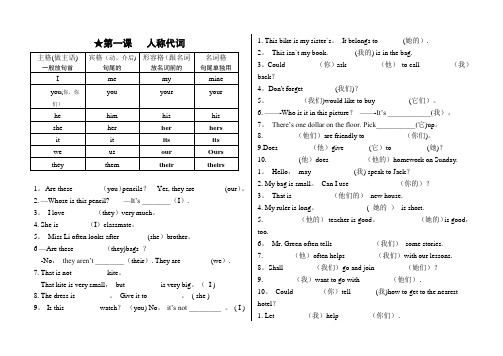
★第一课人称代词1。
Are these ________(you)pencils?Yes, they are ________(our)。
2. —Whose is this pencil? —It’s ________(I).3。
I love ________(they)very much。
4. She is________(I)classmate。
5。
Miss Li often looks after________(she)brother。
6 —Are these ________(they)bags ?-No,they aren’t ________(their). They are ________(we).7. That is not _________ kite。
That kite is very small,but _________ is very big。
(I )8. The dress is _________。
Give it to _________。
( she )9。
Is this _________ watch?(you) No,it’s not _________ 。
( I ) 1. This bike is my sister`s。
It belongs to ______ (她的).2。
This isn`t my book. _______(我的) is in the bag.3。
Could_________(你)ask_________(他)to call_________(我)back?4。
Don't forget_________(我们)?5。
_________(我们)would like to buy_________ (它们)。
6. ——-Who is it in this picture?——-It’s ____________(我)。
7。
There’s one dollar on the floor. Pick___________(它)up。
PEP小学英语语法要点及精选习题-答案
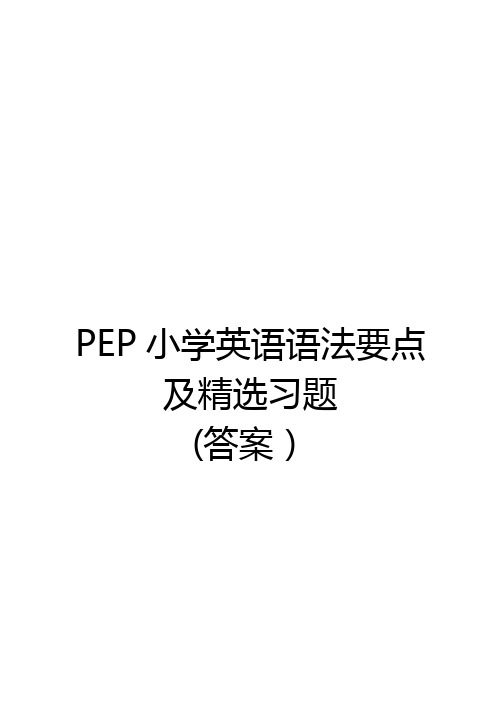
一、写出下列动词的现在分词:
play_playing_run__running__swim __swimming__make__making___
go___going___ski__skiing___
read_reading_have__having__sing __singing___dance_dancing__
3.What are you doingin the playground?
4.What isTomdoing in his study?
四、一般将来时
一、填空。
1。我打算明天和朋友去野炊。
Iamgoingtohave a picnic with my friends。
Iwillhave a picnic with my friends。
come - camehave - hadeat - atetake - took
run - ransing - sangput - putmake - made
read - readwrite - wrotedraw - drewdrink - drank
fly - flewride - rodespeak - spokesweep - swept
19. Davidwill givea puppet show next Monday.
20. Iis planningfor my study now
五、一般过去时
am,is - wasare - weredo - didsee - saw
say - saidgive - gaveget - gotgo - went
looklooksdrawdrawsdropdropsgivegives
小学英语语法讲解及习题

语法第一讲重点:缩写形式;an & a & X 的用法;一般疑问句;否定句;肯定回答/否定回答;单数改为复数Ⅰ. 缩写形式I’m=I am he’s=he is she’s=she is they’re=they areyou’re=you are there’s=there is they’re=they are can’t=can notdon’t=do not doe sn’t=does not isn’t=is not aren’t=are notlet’s=let us won’t=will not I’ll=I will wasn’t=was not总结:通常情况下,'m即am,'s即is(但let’s=let us),'re即are ,n't即not (但can’t=can not)Ⅱ.an & a & X的用法a用在辅音音素前,包括以前元音[j]、[w]开首的词前,读作[E],强调时读作[ei]。
注意,这里讲的辅音音素指的是发音,不是指辅音字母。
an用在元音音素前(不是元音字母),读作[En],强调时读作[An]。
例:a hotel [hEu5tel]一家旅馆a knife [naif] 一把小刀a useful tool [5ju:sful] 一件有用的工具a university [7ju:ni5vE:siti] 一所大学a European country [7juErE5pi(:)En] 一个欧洲国家a one-eyed man ['wQn5aid] 一个一目失明的人an hour [5auE] 一小时an ant [Ant] 一只蚂蚁an honour [5CnE] 一种荣誉an honest boy [5Cnist] 一个诚实的男孩an umbrella [Qm5brelE] 一把伞an onion [5QnjEn] 一个洋葱an eye [ai] 一只眼睛an ear [iE] 一只耳朵an English book [5iN^liF] 一本英语书an egg [e^] 一只鸡蛋an apple [5Apl] 一个苹果an island [5ailEnd] 一座岛an uncle [5QNkl] 一位叔叔an old man [Euld] 一位老人an elephant [5elifEnt] 一头大象a D [di:] 一个D (B、C、G、J、K、P、Q、T、U、V、W、Y、Z前也用a)an F [ef] 一个F(A、E、H、I、L、M、N、O、R、S、X前也用an)Ⅲ.一般疑问句与否定句Be动词的用法口诀:我用am,你用are,is连着他,她,它;单数名词用is,复数名词全用are。
小学英语语法大全-附练习题(附答案)

Contents 第一章名词1.名词的数2.名词的格第二章代词1.人称代词2.物主代词第三章冠词与数词1.冠词2.数词第四章一般现在时态第五章现在进行时态第六章句型1.述句2.疑问句3.祈使句4.There be 句型与have\ has第七章总结考试第一章名词(Noun)名词的概念在生活中,我们会接触到各种各样的人和事物,用来表示这些人或事物名称的词就是名词。
一、名词的数名词的数指名词的单数和复数形式。
可数名词表示“一个”时用单数,“两个以上”时用复数;不可数名词表示量时,通常用“数词+单位+of+物质名词”的形式,如 a piece of bread (一片面包),变为复数时,只须将单位名词变为复数,如:two pieces of bread(两片面包)。
*名词复数的构成法则1. 一般情况下在词尾加 s. 词尾读音shop --- shops (商店) 在清辅音后读 [ s ]bag --- bags (书包) 在浊辅音后读 [ z ]window --- windows (窗户) 在元音后读 [ z]2. 以 s, x, sh, ch 结尾的单词在词尾加es。
class --- classes (班级) 词尾读音[ iz ]box --- boxes (盒子)match --- matches (比赛)brush --- brushes (刷子)3. 以“辅音字母 +y”结尾的词,变y为 i 加es.story --- stories (故事) 词尾读音[ iz ]4. 以“元音字母 +y”结尾的词,在词尾直接加 skey --- keys 词尾读音[ z ]monkey --- monkeys5.以“o”结尾的名词,复数一般在词尾加“s”, 但个别加“es”tomato --- tomatoes (西红柿) 词尾读音[ z ]potato --- potatoes (土豆)zoo --- zoos (动物园)photo --- photos (照片)*(以“o”结尾,复数加“es”)口诀:黑人(Negro)英雄(hero),左手拿着西红柿(tomato),右手拿着破土豆(potato),头顶一个大芒果(mango)。
(完整)小学英语六年级总复习语法及练习题(一)
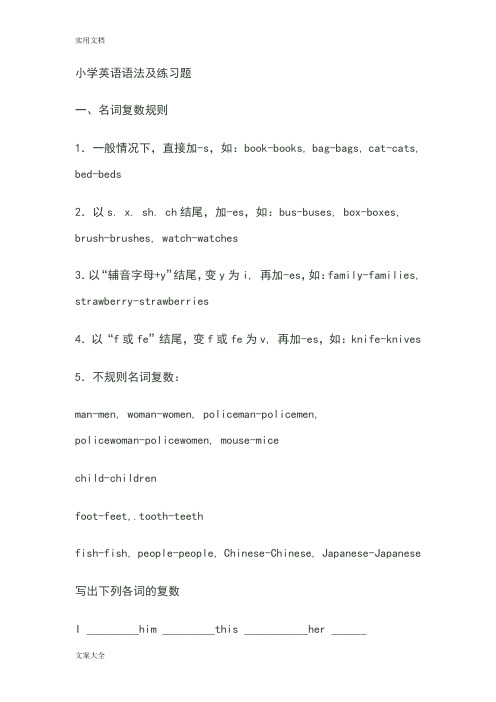
小学英语语法及练习题一、名词复数规则1.一般情况下,直接加-s,如:book-books, bag-bags, cat-cats, bed-beds2.以s. x. sh. ch结尾,加-es,如:bus-buses, box-boxes, brush-brushes, watch-watches3.以“辅音字母+y”结尾,变y为i, 再加-es,如:family-families, strawberry-strawberries4.以“f或fe”结尾,变f或fe为v, 再加-es,如:knife-knives 5.不规则名词复数:man-men, woman-women, policeman-policemen,policewoman-policewomen, mouse-micechild-childrenfoot-feet,.tooth-teethfish-fish, people-people, Chinese-Chinese, Japanese-Japanese 写出下列各词的复数I _________him _________this ___________her ______watch _______child _______photo ________diary ______day________ foot________ book_______ dress ________tooth_______ sheep ______box_______ strawberry _____thief _______yo-yo ______ peach______ sandwich ______man______ woman_______ paper_______ juice___________ water________ milk________ rice__________ tea__________ 二、一般现在时一般现在时基本用法介绍【No. 1】一般现在时的功能1.表示事物或人物的特征、状态。
小学英语语法之现在完成时讲解练习及答案

小学英语语法之现在完成时讲解练习及答案现在完成时是英语语法中的一种时态,用来表示过去发生的动作与现在的相关性。
在这里,我们将为小学生介绍并提供一些现在完成时的讲解练及答案。
一、现在完成时的构成现在完成时由助动词"have/has"与过去分词形式构成。
具体构成如下:- 主语 + have/has + 过去分词二、现在完成时的用法1. 表示过去动作对现在造成的影响或结果。
例如:- I have finished my homework.我已完成作业。
- He has broken his leg.他摔断了腿。
2. 表示过去开始,一直延续到现在的动作。
例如:- She has lived in London since 2010.她自2010年以来一直住在伦敦。
3. 表示已经发生的经历或已经做过的事情。
例如:- Have you ever visited Paris?你有没有去过巴黎?- I have never seen such a beautiful sunset.我从未见过如此美丽的日落。
三、练题及答案1. 选择正确的动词形式填空:- I (have/has) finished my lunch.- She (have/has) studied English for five years. - They (have/has) been to China before.答案:- have- has- have2. 根据提示完成句子,使用现在完成时:- We (travel) to Japan.- He (not finish) his homework yet.- (You/visit) any famous landmarks?答案:- have traveled- has not finished- Have you visited以上是关于小学英语语法之现在完成时的讲解练习及答案。
小学英语语法最综合的讲解和习题
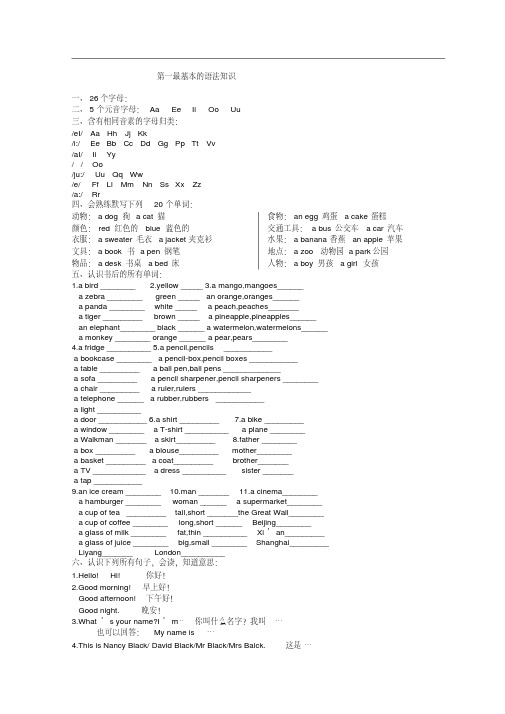
第一最基本的语法知识一、26个字母:二、5个元音字母:Aa Ee Ii Oo Uu三、含有相同音素的字母归类:/eI/ Aa Hh Jj Kk/i:/ Ee Bb Cc Dd Gg Pp Tt Vv/aI/ Ii Yy/ / Oo/ju:/ Uu Qq Ww/e/ Ff Ll Mm Nn Ss Xx Zz/a:/ Rr四、会熟练默写下列20个单词:动物:a dog 狗 a cat 猫颜色:red 红色的blue 蓝色的衣服:a sweater 毛衣 a jacket夹克衫文具:a book 书 a pen 钢笔物品:a desk 书桌 a bed 床食物:an egg 鸡蛋 a cake 蛋糕交通工具: a bus 公交车 a car 汽车水果:a banana 香蕉an apple 苹果地点:a zoo 动物园 a park公园人物:a boy 男孩 a girl 女孩五、认识书后的所有单词:1.a bird ________2.yellow _____3.a mango,mangoes______a zebra ________ green _____ an orange,oranges______a panda ________ white _____ a peach,peaches_______a tiger _________ brown _____ a pineapple,pineapples______an elephant________ black ______ a watermelon,watermelons______a monkey ________ orange ______ a pear,pears________4.a fridge __________5.a pencil,pencils ___________a bookcase ________ a pencil-box,pencil boxes ___________a table _________ a ball pen,ball pens _____________a sofa _________ a pencil sharpener,pencil sharpeners ________a chair _________ a ruler,rulers ____________a telephone ______ a rubber,rubbers ___________a light __________a door ___________ 6.a shirt _________ 7.a bike _________a window ________ a T-shirt __________ a plane ________a Walkman _______ a skirt_________ 8.father ________a box _________ a blouse_________ mother________a basket _________ a coat_________ brother_______a TV ____________ a dress __________ sister _______a tap ___________9.an ice cream ________ 10.man _______ 11.a cinema________a hamburger ________ woman ______ a supermarket________ a cup of tea _________ tall,short _______the Great Wall________ a cup of coffee ________ long,short ______ Beijing________a glass of milk ________ fat,thin __________ Xi’an_________ a glass of juice ________ big,small ________ Shanghai_________ Liyang_______ London__________六、认识下列所有句子,会读,知道意思:1.Hello! Hi! 你好!2.Good morning! 早上好!Good afternoon! 下午好!Good night. 晚安!3.What’s your name?I’m…你叫什么名字?我叫… 也可以回答:My name is … 4.This is Nancy Black/ David Black/Mr Black/Mrs Balck. 这是… (That’s) Helen Brown/Mike Brown/Mr Brown/Mrs Brown 那是… Wang Bing/Liu Tao/Yang Ling /Gao ShanBobby/MimiMiss Li/Mr Green.my father/mother/brother/sistera cat/an apple/...(Mr 先生,Mrs夫人,Miss小姐,在学校Mr称呼男老师,Miss称呼女老师)5.Nice to meet you. 见到你很高兴。
小学英语语法专项练习-时间词讲解及练习题
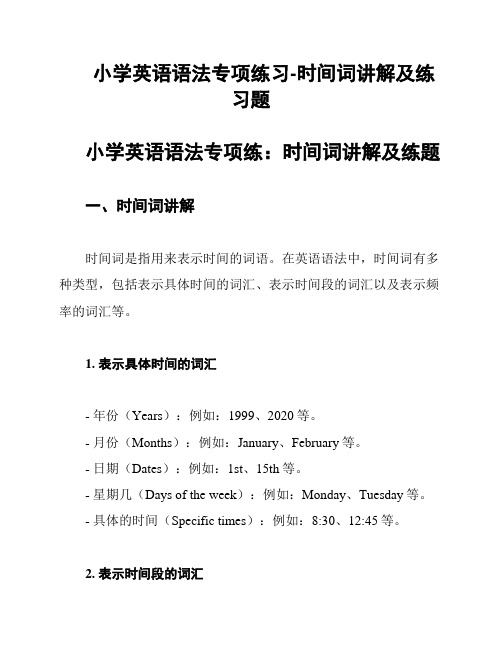
小学英语语法专项练习-时间词讲解及练习题小学英语语法专项练:时间词讲解及练题一、时间词讲解时间词是指用来表示时间的词语。
在英语语法中,时间词有多种类型,包括表示具体时间的词汇、表示时间段的词汇以及表示频率的词汇等。
1. 表示具体时间的词汇- 年份(Years):例如:1999、2020等。
- 月份(Months):例如:January、February等。
- 日期(Dates):例如:1st、15th等。
- 星期几(Days of the week):例如:Monday、Tuesday等。
- 具体的时间(Specific times):例如:8:30、12:45等。
2. 表示时间段的词汇- 几点钟(Hours):例如:an hour、two hours等。
- 几分钟(Minutes):例如:a minute、thirty minutes等。
- 几秒钟(Seconds):例如:a second、ten seconds等。
- 一天(A day):例如:a day、two days等。
- 一周(A week):例如:a week、two weeks等。
- 一个月(A month):例如:a month、six months等。
- 一年(A year):例如:a year、five years等。
3. 表示频率的词汇- 每天(Every day):例如:every day、every other day等。
- 每周(Every week):例如:every week、every Sunday等。
- 每月(Every month):例如:every month、every other month 等。
- 每年(Every year):例如:every year、every other year等。
二、时间词练题请根据所给句子补充适当的时间词。
1. I usually go to bed at ________.2. My birthday is on ________.3. They have English class ________.4. We go swimming ________.5. I brush my teeth ________.6. He reads books for ________.7. They watch TV ________.三、答案1. I usually go to bed at 9 o'clock.9 o'clock.2. My birthday is on June 5th.June 5th.3. They have English class every Monday.every Monday.4. We go swimming every Sunday.every Sunday.5. I brush my teeth twice a day.twice a day.6. He reads books for an hour.an hour.7. They watch TV in the evening.in the evening.希望以上内容对您有所帮助!。
小学英语语法大全-附练习题(附答案)

Contents第一章名词1.名词的数2.名词的格第二章代词1.人称代词2.物主代词第三章冠词与数词1.冠词2.数词第四章一般现在时态第五章现在进行时态第六章句型1.陈述句2.疑问句3.祈使句4.There be 句型与have\ has第七章总结考试第一章名词(Noun)名词的概念在生活中,我们会接触到各种各样的人和事物,用来表示这些人或事物名称的词就是名词。
一、名词的数名词的数指名词的单数和复数形式。
可数名词表示“一个”时用单数,“两个以上”时用复数;不可数名词表示量时,通常用“数词+单位+of+物质名词”的形式,如 a piece of bread (一片面包),变为复数时,只须将单位名词变为复数,如:two pieces of bread(两片面包)。
*名词复数的构成法则1. 一般情况下在词尾加 s. 词尾读音shop --- shops (商店) 在清辅音后读[ s ]bag --- bags (书包) 在浊辅音后读[ z ]window --- windows (窗户) 在元音后读[ z ]2. 以s, x, sh, ch 结尾的单词在词尾加es。
class --- classes (班级) 词尾读音[ iz ]box --- boxes (盒子)match --- matches (比赛)brush --- brushes (刷子)3. 以“辅音字母+y”结尾的词,变y为i 加es.story --- stories (故事) 词尾读音[ iz ]4. 以“元音字母+y”结尾的词,在词尾直接加skey --- keys 词尾读音[ z ]monkey --- monkeys5.以“o”结尾的名词,复数一般在词尾加“s”, 但个别加“es”tomato --- tomatoes (西红柿) 词尾读音[ z ]potato --- potatoes (土豆)zoo --- zoos (动物园)photo --- photos (照片)*(以“o”结尾,复数加“es”)口诀:黑人(Negro)英雄(hero),左手拿着西红柿(tomato),右手拿着破土豆(potato),头顶一个大芒果(mango)。
小学英语语法练习
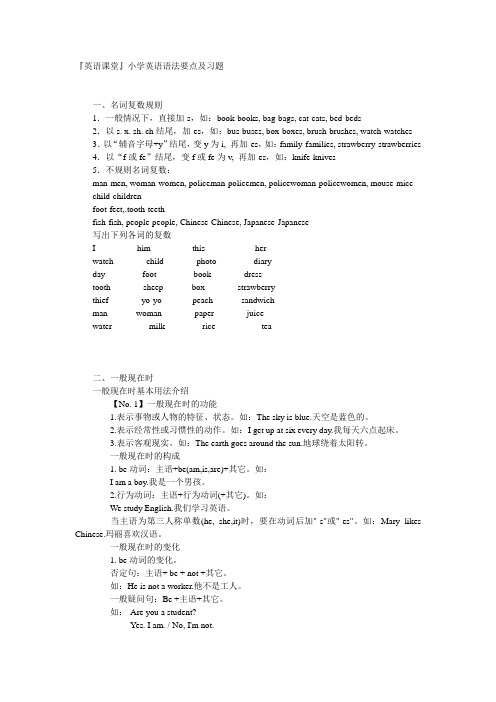
『英语课堂』小学英语语法要点及习题一、名词复数规则1.一般情况下,直接加-s,如:book-books, bag-bags, cat-cats, bed-beds2.以s. x. sh. ch结尾,加-es,如:bus-buses, box-boxes, brush-brushes, watch-watches 3.以“辅音字母+y”结尾,变y为i, 再加-es,如:family-families, strawberry-strawberries 4.以“f或fe”结尾,变f或fe为v, 再加-es,如:knife-knives5.不规则名词复数:man-men, woman-women, policeman-policemen, policewoman-policewomen, mouse-mice child-childrenfoot-feet,.tooth-teethfish-fish, people-people, Chinese-Chinese, Japanese-Japanese写出下列各词的复数I _________him _________this ___________her ______watch _______child _______photo ________diary ______day________ foot________ book_______ dress ________tooth_______ sheep ______box_______ strawberry _____thief _______yo-yo ______ peach______ sandwich ______man______ woman_______ paper_______ juice___________water________ milk________ rice__________ tea__________二、一般现在时一般现在时基本用法介绍【No. 1】一般现在时的功能1.表示事物或人物的特征、状态。
小学英语语法——形容词与副词知识点讲解+练习

形容词和副词一、形容词、副词概述1、形容词定义:形容词(adjective),简称adj,用来修饰名词或代词,表示人或事物的性质、状态和特征。
2、副词定义:副词(adverb),简称adv,用来修饰动词、形容词或副词,表示时间、频率、范围、语气、程度等。
二、形容词、副词考点纵览三、综合练习( ) 1. How beautifully she sings! I have never heard _____ voice.A. a betterB. a bestC. the betterD. the best ( ) 2. She looks very _____ but I can’t remember her name.A. similarB. familiarC. friendlyD. strange ( ) 3. Children all looked _____ at the broken model plane and felt quite _____.A. sad; sadB. sadly; sadlyC. sad; sadlyD. sadly; sad( ) 4. The child dreamed that he had once lived in a _______ house in the forest.A. wooden pretty littleB. little pretty woodenC. pretty little woodenD. wooden little pretty( ) 5. ---Which team is _______ to win the game?---I don’t know, but I’ve found _______ for ours to win.A. probable; it unlikelyB. likely; it possibleC. possible; it possibleD. likely; it possibly( ) 6. With the development of the Internet, _______ communication is done by regular mail.A. lessB. moreC. littleD. few( ) 7. ---If you don’t like the red coat, take the blue one.---OK, but do you have ______ size in blue? This one’s a bit tight for me.A. a bigB. a biggerC. the bigD. the bigger( ) 8. If there were no examinations, we should have ______ at school.A. the happiest timeB. a more happier timeC. much happiest timeD. a much happier time( ) 9. This dress is prettier, but it costs ______ that one.A. twice more thanB. twice as much asC. as much twice asD. twice so much as( ) 10.________students are required to take part in the boat race.A. Ten strong young ChineseB. Ten Chinese strong youngC. Chinese ten young strongD. Young strong ten Chinese( ) 11. Allen had to call a taxi because the box was ____to carry all the way home.A. much too heavyB. too much heavyC. heavy too muchD. too heavy much( ) 12. Our neighbor has ________ours.A. as a big house asB. as big a house asC. the same big house asD. a house the same big as( ) 13. We were in ________when we left that we forgot the airline tickets.A. a rush so anxiousB. a such anxious rushC. so an anxious rushD. such an anxious rush( ) 14. ---I was riding along the street and all of a sudden, a car cut in and knocked me down.---You can never be ________careful in the street.A. muchB. veryC. soD. too( ) 15. ---You don’t look very ________.Are you ill?---No,I’m just a bit tired.A. goodB. wellC. strongD. healthy( ) 16. Four of Robert’s children were at the party,including ________, Luke.A. the eldestB. an oldest oneC. the oldD. an old one( ) 17. Many students signed up for the ________race in the sports meeting to be held next week.A. 800-metre-longB. 800-metres-longC. 800 metre lengthD. 800 metres length( ) 18. It’s always difficult being in a foreign country,________if you don’t speak the language.A. extremelyB. naturallyC. basicallyD. especially( ) 19. In recent years,travel companies have succeeded in selling us the idea that the further we go,__________.A. our holiday will be betterB. our holiday will be the betterC. the better our holiday will beD. the better will our holiday be( ) 20. When he heard a cry for help, he ran out as ________ as he could.A. hardlyB. quicklyC. finallyD. slowly( ) 21. “Our team is _____ to win the match.” “Really? But I don’t think so.”A. easyB. difficultC. possibleD. sure( ) 22. A ______ road goes ______ from one place to another.A. straight; straightB. straightly; straightlyC. straight; straightlyD. straightly; straight( ) 23. “This book is ______ more useful for us students.” “Yes, but it is _______ too difficult.”A. quite; quiteB. much; ratherC. rather; quite D quite; much( ) 24. There was a ______ change in the weather, and the rain came pouring down.A. quickB. slowC. fastD. sudden( ) 25. You can speak ______ in front of him, but you can’t eat ______ in his restaurant.A. freely; freelyB. free; freelyC. freely; freeD. free; free( ) 26. Tom will not be at the picnic, ______ to the family’s disappointment.A. muchB. moreC. too muchD. much more( ) 27. --- I have seen so little of Mike ______. Is he away on business?--- Oh, no. He just leaves for his office early and comes back very ______.A. later; latelyB. later; laterC. lately; lateD. late; lately( ) 28. From his ______ voice on the phone I know everything is well under way.A. satisfactoryB. satisfyingC. satisfiedD. satisfaction( ) 29. In ______ Chinese culture, marriage decisions were often made by parents for their children.A. traditionalB. historicC. peacefulD. civil( ) 30. The houses in the village are ______ built of wood and hay.A. mostB. almostC. nearlyD. mostly( ) 31. --- What do people wear when they go to the theatre?--- Well, it isn’t very ______. People can wear anything they like.A. normalB. certainC. modernD. simple( ) 32. Mary’s biology is ______ than ______ in the class.A. a lot of better; anyone else’sB. far better; anyone’s else’sC. much better; anyone elseD. a lot better; anyone else’s( ) 33. We decided not to climb the mountains because it was raining ____.A. badlyB. hardlyC. stronglyD. heavily( ) 34. Paris is one of _____ cities in the world.A. more beautifullyB. more beautifulC. the most beautifullyD. the most beautiful ( ) 35. Are you going to leave______?A. the open windowsB. the windows openingC. the windows openD. the windows opened( ) 36. Bob never does his homework _____ Mary, so he makes lots of mistakes.A. so careful asB. as carefully asC. carefully asD. as careful as.( ) 37. My sister is good at sports. She can jump ____ than me.A. highestB. very highC. too highD. much higher ( ) 38. When spring comes, the trees get ____.A. green and greenB. green and greenerC. greener and greenD. greener and greener( ) 39.He works very ___________.He _____________has a rest on Sundays.A. hard; hardlyB. hardly; hardC. hard; hardD. hardly; hardly( ) 40.He learns Russian_____________.A. goodB. niceC. wellD. fine( ) 41.The boy didn’t run______________ to catch the bus.A. fast enoughB. enough fastC. quick enoughD. enough quickly ( ) 42.Eating _____________ is bad for our health.A. much tooB. too muchC. too moreD. too many( ) 43.Have you ever seen ______________ big panda before?A. a suchB. such aC. so aD. as( ) 44.He looks very _____________ today.A. worriedB. worryC. worryingD. to worry( ) 45.Listen to me. I have _____________ to tell you.A. important somethingB. important anythingC. something importantD. anything important( ) 46. ---How ___ can you finish the drawing?--- In ten minutes.A. longB. often.C. soonD. rapid( ) 47. This book is _____ worth seeing again.A. veryB. quiteC. wellD. much( ) 48. My _____ brother is three years ____ than I .A. old; olderB. elder; olderC. older; elderD. old; elder( ) 49. We felt ___ after we watched the ___ football match.A. exciting; excitedB. excited; excitingC. excited; excitedD. exciting; exciting( ) 50. The old man lived ____ in the house, but he didn’t feel___.A. lonely; lonelyB. alone; lonelyC. alone; aloneD. lonely; alone小学英语语法——形容词与副词知识点讲解+练习参考答案1. A2.B3.D4.C5.B6.A7.B8.D9.B 10.A 11. A 12.B 13.D 14.D 15.B 16.A 17.A 18.D 19.C 20.B 21. D 22.A 23.B 24.D 25.C 26.A 27.C 28.C 29.A 30.D 31. B 32.D 33.D 34.D 35.C 36.B 37.D 38.D 39.A 40.C 41. A 42.B 43.B 44.A 45.C 46.C 47.C 48.B 49.B 50.B11。
小学英语各种语法及练习题

小学英语各种语法和练习题一、名词复数规则1.一般情况下,直接加-s,如:book-books, bag-bags, cat-cats, bed-beds2.以s. x. sh. ch结尾,加-es,如:bus-buses, box-boxes, brush-brushes, watch-watches3.以“辅音字母+y”结尾,变y为i, 再加-es,如:family-families, strawberry-strawberries4.以“f或fe”结尾,变f或fe为v, 再加-es,如:knife-knives 5.不规则名词复数:man-men, woman-women, policeman-policemen,policewoman-policewomen, mouse-micechild-childrenfoot-feet,.tooth-teethfish-fish, people-people, Chinese-Chinese,Japanese-Japanese写出下列各词的复数I _________him _________this ___________her ______ watch _______child _______photo ________diary ______ day________ foot________ book_______ dress ________ tooth_______ sheep ______box_______ strawberry _____ thief _______yo-yo ______ peach______ sandwich ______man______ woman_______paper_______ juice___________water________ milk________ rice__________ tea__________ 二、一般现在时一般现在时基本用法介绍【No. 1】一般现在时的功能1.表示事物或人物的特征、状态。
小学英语语法——介词知识点讲解+练习
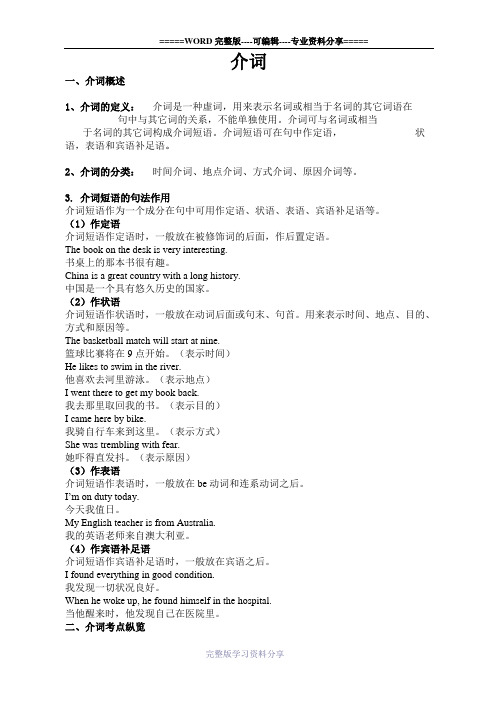
介词一、介词概述1、介词的定义:介词是一种虚词,用来表示名词或相当于名词的其它词语在句中与其它词的关系,不能单独使用。
介词可与名词或相当于名词的其它词构成介词短语。
介词短语可在句中作定语,状语,表语和宾语补足语。
2、介词的分类:时间介词、地点介词、方式介词、原因介词等。
3. 介词短语的句法作用介词短语作为一个成分在句中可用作定语、状语、表语、宾语补足语等。
(1)作定语介词短语作定语时,一般放在被修饰词的后面,作后置定语。
The book on the desk is very interesting.书桌上的那本书很有趣。
China is a great country with a long history.中国是一个具有悠久历史的国家。
(2)作状语介词短语作状语时,一般放在动词后面或句末、句首。
用来表示时间、地点、目的、方式和原因等。
The basketball match will start at nine.篮球比赛将在9点开始。
(表示时间)He likes to swim in the river.他喜欢去河里游泳。
(表示地点)I went there to get my book back.我去那里取回我的书。
(表示目的)I came here by bike.我骑自行车来到这里。
(表示方式)She was trembling with fear.她吓得直发抖。
(表示原因)(3)作表语介词短语作表语时,一般放在be动词和连系动词之后。
I’m on duty today.今天我值日。
My English teacher is from Australia.我的英语老师来自澳大利亚。
(4)作宾语补足语介词短语作宾语补足语时,一般放在宾语之后。
I found everything in good condition.我发现一切状况良好。
When he woke up, he found himself in the hospital.当他醒来时,他发现自己在医院里。
(完整版)小学英语语法一本全附练习题
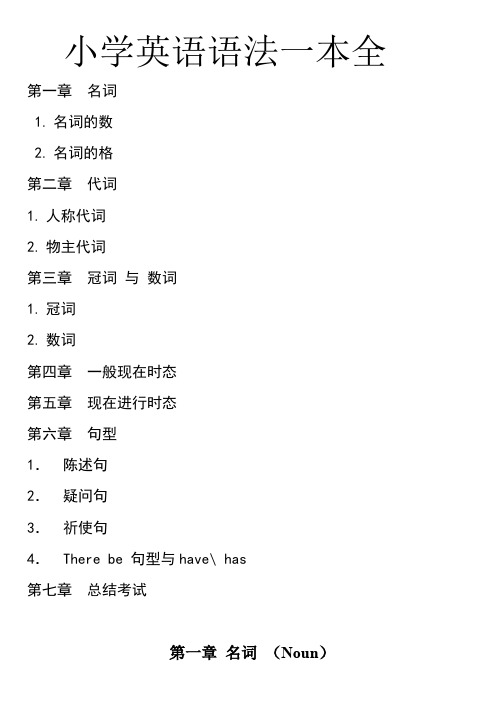
小学英语语法一本全第一章名词1.名词的数2.名词的格第二章代词1.人称代词2.物主代词第三章冠词与数词1.冠词2.数词第四章一般现在时态第五章现在进行时态第六章句型1.陈述句2.疑问句3.祈使句4.There be 句型与have\ has第七章总结考试名词的概念在生活中,我们会接触到各种各样的人和事物,用来表示这些人或事物名称的词就是名词。
一、名词的数名词的数指名词的单数和复数形式。
可数名词表示“一个”时用单数,“两个以上”时用复数;不可数名词表示量时,通常用“数词+单位+of+物质名词”的形式,如 a piece of bread (一片面包),变为复数时,只须将单位名词变为复数,如:two pieces of bread(两片面包)。
*名词复数的构成法则1. 一般情况下在词尾加 s. 词尾读音shop --- shops (商店) 在清辅音后读[ s ]bag --- bags (书包) 在浊辅音后读[ z ]window --- windows (窗户) 在元音后读[ z ]2. 以s, x, sh, ch 结尾的单词在词尾加es。
class --- classes (班级) 词尾读音[ iz ]box --- boxes (盒子)match --- matches (比赛)brush --- brushes (刷子)3. 以“辅音字母+y”结尾的词,变y为i 加es.story --- stories (故事) 词尾读音[ iz ]4. 以“元音字母+y”结尾的词,在词尾直接加skey --- keys 词尾读音[ z ]monkey --- monkeys5.以“o” 结尾的名词,复数一般在词尾加“s”, 但个别加“es”tomato --- tomatoes (西红柿) 词尾读音[ z ]potato --- potatoes (土豆)zoo --- zoos (动物园)photo --- photos (照片)*(以“o”结尾,复数加“es”)口诀:黑人(Negro)英雄(hero),左手拿着西红柿(tomato),右手拿着破土豆(potato),头顶一个大芒果(mango)。
小学英语语法及练习题
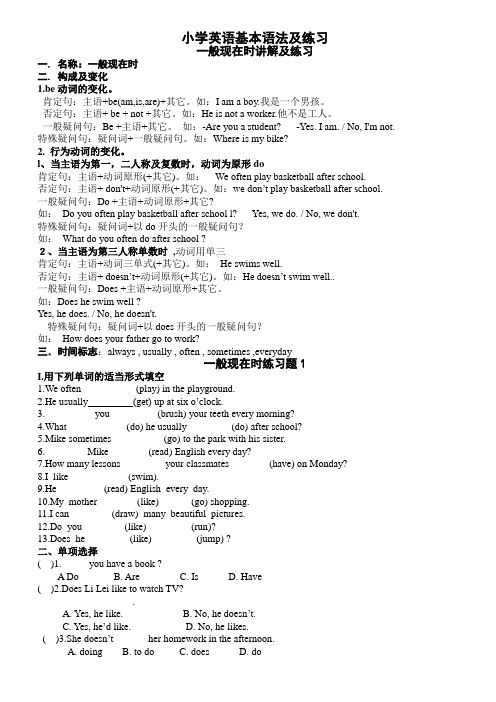
小学英语基本语法及练习一般现在时讲解及练习一. 名称:一般现在时二. 构成及变化1.be动词的变化。
肯定句:主语+be(am,is,are)+其它。
如:I am a boy.我是一个男孩。
否定句:主语+ be + not +其它。
如:He is not a worker.他不是工人。
一般疑问句:Be +主语+其它。
如:-Are you a student? -Yes. I am. / No, I'm not. 特殊疑问句:疑问词+一般疑问句。
如:Where is my bike?2. 行为动词的变化。
l、当主语为第一,二人称及复数时,动词为原形do肯定句:主语+动词原形(+其它)。
如:We often play basketball after school.否定句:主语+ don't+动词原形(+其它)。
如:we don’t play basketball after school.一般疑问句:Do +主语+动词原形+其它?如:Do you often play basketball after school l? Yes, we do. / No, we don't.特殊疑问句:疑问词+以do开头的一般疑问句?如:What do you often do after school ?2、当主语为第三人称单数时,动词用单三肯定句:主语+动词三单式(+其它)。
如:He swims well.否定句:主语+ doesn’t+动词原形(+其它)。
如:He doesn’t swim well..一般疑问句:Does +主语+动词原形+其它。
如:Does he swim well ?Yes, he does. / No, he doesn't.特殊疑问句:疑问词+以does开头的一般疑问句?如:How does your father go to work?三.时间标志:always , usually , often , sometimes ,everyday一般现在时练习题1I.用下列单词的适当形式填空1.We often___________(play) in the playground.2.He usually_________(get) up at six o’clock.3.__________you _________(brush) your teeth every morning?4.What____________(do) he usually_________(do) after school?5.Mike sometimes __________(go) to the park with his sister.6.________ Mike________(read) English every day?7.How many lessons_________your classmates________(have) on Monday?8.I like ___________ (swim).9.He _________(read) English every day.10.My mother________(like) ______(go) shopping.11.I can ________(draw) many beautiful pictures.12.Do you ________(like)_________(run)?13.Does he_________(like)_________(jump) ?二、单项选择( )1._____ you have a book ?A Do B. Are C. Is D. Have( )2.Does Li Lei like to watch TV?______________.A. Yes, he like.B. No, he doesn’t.C. Yes, he’d like.D. No, he likes.( )3.She doesn’t ______ her homework in the afternoon.A. doingB. to doC. doesD. do( )4.How ____ Mr. Smith ______ to England?A. do, goB. is , goC. does, goD. does , goes( )5. _____ she ______ home at six every day?A. Is , leaveB. Does , leaveC. Is , leavesD. Does , left三、按要求完成下列各题1.Tomorrow is Saturday.(变成一般疑问句)_________ ________ Saturday ?2.Does he play basketball every weekend? (肯定回答)Yes, ______ _______.3.She looks like her sister.(变一般疑问句)_____ she ______ like her sister ?4.Peter and Sam look the same.(一般疑问句)______ they _____ the same ?5.Do they always go to the movie (电影院) on Sundays ? (否定回答)No, _______ _______.现在进行时态精讲精练1.名称:现在进行时例:I am reading an English book now. 我现在正在读一本英语书。
小学英语语法练习题及答案

小学英语语法练习题及答案小学英语语法练习题及答案【篇一:小学英语语法及练习题--名词】定义名词可以分为专有名词和普通名词,专有名词是某个(些)人,地方,机构等专有的名称,如beijing,china等。
普通名词是一类人或东西或是一个抽象概念的名词,如:book,sadness等。
普通名词又可分为下面四类:1)个体名词:表示某类人或东西中的个体,如:gun。
2)集体名词:表示若干个个体组成的集合体,如:family。
4)抽象名词:表示动作、状态、品质、感情等抽象概念,如:work。
个体名词和集体名词可以用数目来计算,称为可数名词,物质名词和抽象名词一般无法用数目计算,称为不可数名词。
2. 名词复数的规则变化(情况,构成方法,读音,例词)a. 一般情况在名词后加-s清辅音后读/s/map-maps浊辅音和元音后读 /z/bag-bags /car-carsb. 以s, sh, ch, x等结尾的名词加-es读 /iz/bus-buses/ watch-watches/brush-brushes/box-boxesc. 以ce, se, ze,等结尾加 -s读 /iz/license-licensesd. 以辅音字母+y结尾的名词把变y 为i再加es读 /z/baby---babiese. 以o 结尾的名词,变复数时:1). 加s,如: photo---photos piano---pianosradio---radioszoo---zoos;2). 加es,如:potato--potatoes tomato--tomatoes3). 上述a和b两种方法均可,如zero---zeros / zeroes。
f. 以f或fe 结尾的名词变复数时:1). 加s,如: belief---beliefsroof---roofssafe---safes gulf---gulfs2). 去f, fe 加ves,如:half---halvesknife---knives leaf---leaves wolf---wolveswife---wives life---lives thief---thieves3). 上述a和b两种方法均可,如handkerchief: handkerchiefs / handkerchieves。
完整版)小学英语语法及练习题
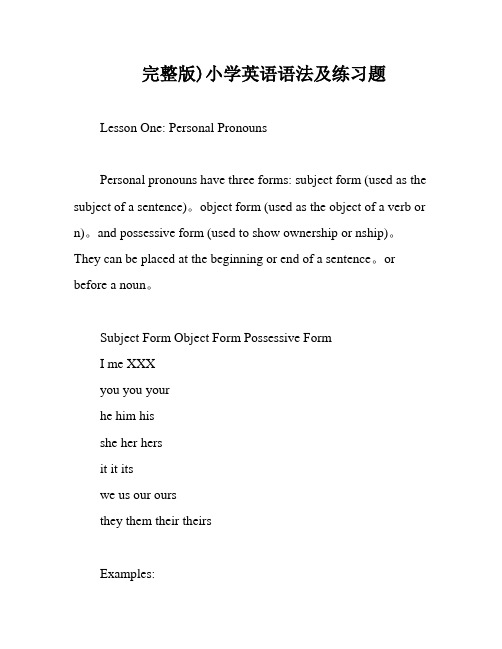
完整版)小学英语语法及练习题Lesson One: Personal PronounsPersonal pronouns have three forms: subject form (used as the subject of a sentence)。
object form (used as the object of a verb or n)。
and possessive form (used to show ownership or nship)。
They can be placed at the beginning or end of a sentence。
or before a noun。
Subject Form Object Form Possessive FormI me XXXyou you yourhe him hisshe her hersit it itswe us our oursthey them their theirsExamples:1.Are these your pencils。
Yes。
they are ours.2.Whose is this pencil。
It's XXX.3.I love them very much.4.XXX.5.Miss Li often looks after her XXX.6.Are these their bags。
No。
they XXX.7.That is not my kite。
That kite is very small。
but mine is very big.8.The dress is hers。
Give it to her.9.Is this your watch。
No。
it's not XXX.1.This bike is my sister's。
It belongs to her.2.This isn't my book。
小学英语语法专项练习-动词讲解及练习题

小学英语语法专项练习-动词讲解及练习题一、动词的概念动词是表示人、事物的动作、状态或存在的词,是英语句子中最核心的部分。
二、动词的分类1. 及物动词:需要加宾语才能构成句子的动词,例如:write、eat等。
2. 不及物动词:不需要加宾语也可以构成句子的动词,例如:laugh、sit等。
3. 助动词:辅助主要动词构成各种时态、语态和否定式,例如:be、do等。
三、动词时态动词时态表示动作发生的时间,常用的动词时态有以下几种:1. 一般现在时:表示现在正在发生的事情或经常性的动作。
2. 一般过去时:表示过去发生的动作或状态。
3. 一般将来时:表示将要发生的动作或状态。
4. 现在进行时:表示现在正在进行的动作或状态。
5. 过去进行时:表示过去某个时刻正在进行的动作或状态。
6. 将来进行时:表示将来某个时刻正在进行的动作或状态。
四、动词的练题1. 用所给动词的正确形式填空:1) He often ____(play) football with his friends after school.2) My father ____(be) a doctor when he was young.3) They ____(visit) the museum tomorrow morning.4) She ____(watch) TV now.2. 根据括号内的提示写出动词正确的形式:1) He usually ____(drink) milk in the morning. (一般现在时)2) We ____(cook) dinner at six o'clock last night. (一般过去时)3) Tomorrow we ____(go) to the park to have a picnic. (一般将来时)4) Look! The boy ____(swim) in the river. (现在进行时)以上是小学英语语法专项练习-动词讲解及练习题,希望有所帮助!。
- 1、下载文档前请自行甄别文档内容的完整性,平台不提供额外的编辑、内容补充、找答案等附加服务。
- 2、"仅部分预览"的文档,不可在线预览部分如存在完整性等问题,可反馈申请退款(可完整预览的文档不适用该条件!)。
- 3、如文档侵犯您的权益,请联系客服反馈,我们会尽快为您处理(人工客服工作时间:9:00-18:30)。
小学英语语法讲解及习题——时态篇:(一)一般现在时基本用法介绍与练习一般现在时的功能1.表示事物或人物的特征、状态。
如:The sky is blue.天空是蓝色的。
2.表示经常性或习惯性的动作。
如:I get up at six every day.我每天六点起床。
3.表示客观现实。
如:The earth goes around the sun.地球绕着太阳转。
一般现在时的构成1.be动词:主语+be(am,is,are)+其它。
如:I am a boy.我是一个男孩。
2.行为动词:主语+行为动词(+其它)。
如:We study English.我们学习英语。
【注意】当主语为第三人称单数(he,she,it)时,要在动词后加"-s"或"-es"。
如:Mary likes Chinese.玛丽喜欢汉语。
一般现在时的变化1.be动词的变化。
否定句:主语+be+not+其它。
如:He is not a worker.他不是工人。
一般疑问句:Be+主语+其它。
如:-Are you a student?-Yes.I am./No,I'm not.特殊疑问句:疑问词+一般疑问句。
如:Where is my bike?2.行为动词的变化。
否定句:主语+don't(doesn't)+动词原形(+其它)。
如:I don't like bread.当主语为第三人称单数时,要用doesn't构成否定句。
如:He doesn't often play.一般疑问句:Do(Does)+主语+动词原形+其它。
如:-Do you often play football?-Yes,I do./No,I don't.当主语为第三人称单数时,要用does构成一般疑问句。
如:-Does she go to work by bike?-Yes,she does./No,she doesn't.特殊疑问句:疑问词+一般疑问句。
如:How does your father go to work?3.动词+s的变化规则1.一般情况下,直接加-s,如:cook-cooks,milk-milks2.以s.x.sh.ch.o结尾,加-es,如:guess-guesses,wash-washes,watch-watches,go-goes3.以“辅音字母+y”结尾,变y为i,再加-es,如:study-studies一般现在时用法专练:一、写出下列动词的第三人称单数drink________go________stay________make________look________have________pass________carry________come________watch________plant________fly________study________brush________do________teach________二、用括号内动词的适当形式填空。
1.He often________(have)dinner at home.2.Daniel and Tommy_______(be)in Class One.3.We_______(not watch)TV on Monday.4.Nick_______(not go)to the zoo on Sunday.5.______they________(like)the World Cup?6.What_______they often_______(do)on Saturdays?7._______your parents_______(read)newspapers every day?8.The girl_______(teach)us English on Sundays.9.She and I________(take)a walk together every evening.10.There________(be)some water in the bottle.11.Mike_______(like)cooking.12.They_______(have)the same hobby.13.My aunt_______(look)after her baby carefully.14.You always_______(do)your homework well.15.I_______(be)ill.I’m staying in bed.16.She_______(go)to school from Monday to Friday.17.Liu Tao_______(do)not like PE.18.The child often_______(watch)TV in the evening.19.Su Hai and Su Yang_______(have)eight lessons this term.20.-What day_______(be)it today?-It’s Saturday.三、按照要求改写句子1.Daniel watches TV every evening.(改为否定句)___________________________________________________2.I do my homework every day.(改为一般疑问句,作否定回答)___________________________________________________3.She likes milk.(改为一般疑问句,作肯定回答)___________________________________________________4.Amy likes playing computer games.(改为一般疑问句,作否定回答)___________________________________________________5.We go to school every morning.(改为否定句)___________________________________________________6.He speaks English very well.(改为否定句)___________________________________________________7.I like taking photos in the park.(对划线部分提问)___________________________________________________8.John comes from Canada.(对划线部分提问)___________________________________________________9.She is always a good student.(改为一般疑问句,作否定回答)___________________________________________________10.Simon and Daniel like going skating.(改为否定句)___________________________________________________五、改错(划出错误的地方,将正确的写在横线上)1.Is your brother speak English?___________________________________________________2.Does he likes going fishing?___________________________________________________3.He likes play games after class.___________________________________________________4.Mr.Wu teachs us English.___________________________________________________5.She don’t do her homework on Sundays.___________________________________________________(二)现在进行时基本用法介绍与练习1.现在进行时表示现在正在进行或发生的动作,也可表示当前一段时间内的活动或现阶段正在进行的动作。
2.现在进行时的肯定句基本结构为be+动词ing.3.现在进行时的否定句在be后加not。
4.现在进行时的一般疑问句把be动词调到句首。
5.现在进行时的特殊疑问的基本结构为:疑问词+be+主语+动词ing?但疑问词当主语时其结构为:疑问词+be+动词ing?动词加ing的变化规则1.一般情况下,直接加ing如:cook-cooking2.以不发音的e结尾,去e加ing如:make-making,taste-tasting3.如果末尾是一个元音字母和一个辅音字母,双写末尾的辅音字母,再加ing如:run-running,stop-stopping现在进行时专项练习:一、写出下列动词的现在分词:play________run________swim________make________go________like________write________ski________read________have________sing________dance________put________see________buy________love________live________take________stop________sit________begin________shop________come________get________二、用所给的动词的正确形式填空:1.The boy________(draw)a picture now.2.Listen.Some girls________(sing)in the classroom.3.My mother________(cook)some nice food now.4.What________you________(do)now?5.Look.They________(have)an English lesson.6.They________(not water)the flowers now.7.Look!the girls________(dance)in the classroom.8.What is our granddaughter doing?She________(listen)to music.9.It’s5o’clock now.We________(have)supper now.10.-________Helen________(wash)clothes?-Yes,she is.三、句型转换:1.They are doing housework.(分别改成一般疑问句和否定句)__________________________________________________________________________________________________________________2.The students are cleaning the classroom.(改一般疑问句并作肯定和否定回答)__________________________________________________________________________________________________________________3.I’m playing the football in the playground.(对划线部分进行提问)_________________________________________________________4.Tom is reading books in his study.(对划线部分进行提问)_________________________________________________________(三)一般将来时基本用法介绍与练习一、概念表示将要发生的动作或存在的状态及打算、计划或准备做某事。
